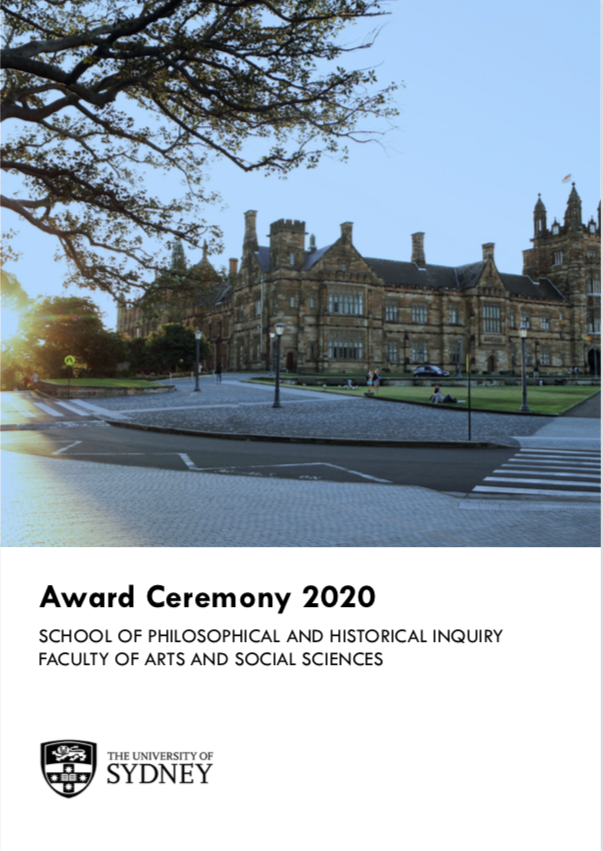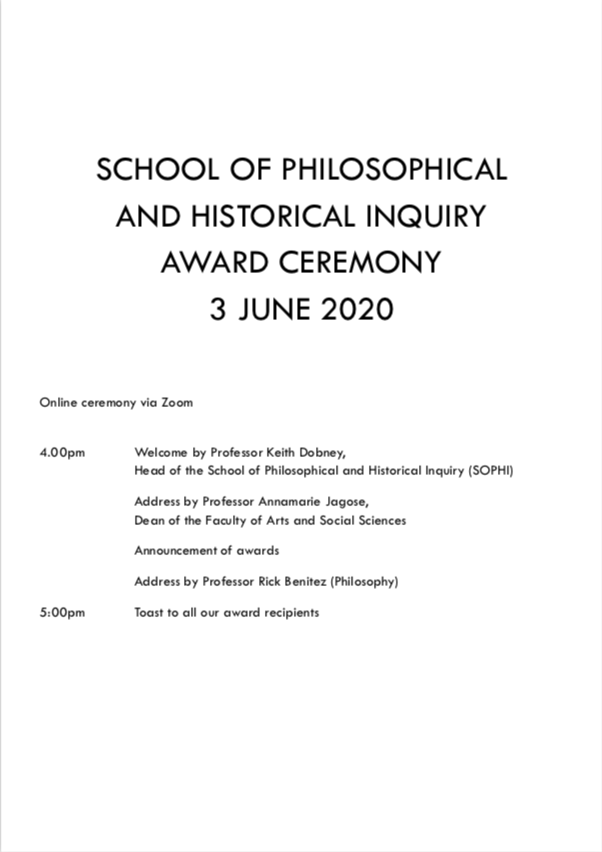 |
 Travel in time and space with the Department of History in 2021 We have a range of exciting options in second semester taught by world-class experts in their fields. Find out more about today’s world by studying and understanding its past. Below are just a few of our offerings. Semester 2 2021 HSTY2606: China’s Last Dynasty: The Great Qing Explore a broad sweep of China’s history, from the seventeenth to the early twentieth centuries in HSTY2606 China’s Last Dynasty: The Great Qing with Dr David Brophy. An influential historian, public intellectual and activist, David has just published China Panic: Australia’s Alternative to Paranoia and Pandering. HSTY2647: Renaissance Italy Wishing you could be in Florence? Let Associate Professor Nick Eckstein, internationally recognized authority on all things Renaissance, from art to plague, be your guide. Sign up for HSTY2647: Renaissance Italy and witness the extraordinary cultural flowering that occurred in Italy between the 14th and the 16th centuries. HSTY2652: Genocide in Historical Perspective Dr Marco Duranti, leading historian of human rights, teaches HSTY2652: Genocide in Historical Perspective. Why do genocides occur? Was imperialism genocidal? Is there such a thing as ‘cultural genocide’? We tackle these controversies – and much more – through a survey of the global history of genocide from the nineteenth century to the present. HSTY2677: Australia: Politics and Nation Are we an ‘independent’ nation? Staying closer to home, in HSTY2677 Australia: Politics and Nation, Professor James Curran (together with Dr Ryan Cropp) take us on a journey from the colonial period to the present, raising the questions of political culture and nationalism we still wrestle with today. A leading scholar of politics and foreign relations, James is a regular public commentator and a columnist in the Australian Financial Review. Read Professor Curran’s latest article here.) If you are interested in these units and don’t meet the pre-requisites, you can submit an “enrolment exception request” via Sydney Student. What about a first year July Intensive to fast-track your degree? HSTY1089: Introduction to Australian History Australia has been called the ‘quiet continent’, but conflict has been part of its history since 1788. This unit examines the violence of convict society, frontier conflict and early battles for self-government. It maps the political struggles, contested stories and shifts in Indigenous-settler relations that accompanied the creation of a nation state after 1880, and explores the effects of war on different social groups. Finally, it charts Australia’s cultural and political transformation after 1945 into the postindustrial postcolonial society of today. Watch this video to find out more about HSTY1089! Find out more about the Department of History’s offerings, a major in History, degree progresssion, Honours, and much more! Our Department guide has the most up-to-date information on units of study on offer. If you have any queries about units of study, please contact the unit coordinator or the SOPHI Office. E | [email protected] Interested in where a Major in History can take you? Each year we run a session where students can hear from graduates from the Department to learn about making the transition from university to the job market. Check out our information session from 2020. |
 Keep in touch Keep in touch |
Author: Michael McDonnell
Vale Neville Meaney
By Professor James Curran
It is with great sadness that I inform you that our former colleague and friend, Neville Meaney, passed away on Sunday. He was a scholar, historian and mentor to many, including myself. Neville was appointed to teach American history here in 1962 after doing his PhD at Duke: he retired in 2006. His contribution to the intellectual life of the university, to the department, to his field and indeed to the country is vast.
Neville’s scholarship on Australian foreign and defence policy in particular towers above the rest – his work on the period 1901-1923 is nothing short of magisterial and his account of Australia and the First World War, published in 2010, is the best treatment of the subject. It was in many ways his magnum opus. His documentary history of Australia and the World, his work on Australia-Japanese relations and his many articles and reviews on Australia and America’s relations with the world broke new ground. His article on ‘Britishness and Australian nationalism’ in Australian Historical Studies in April 2001 is still one of the most frequently downloaded pieces in that journal. And his courses on the American national myth, US foreign policy, Australian foreign policy and Australian political culture inspired several generations of students who went on to either academic careers or senior positions in the Australian public service, including in the Department of Foreign Affairs.
In our introduction to an edited collection of his most important articles, Stuart Ward (who also studied under Neville) and I wrote:
“We first encountered Neville in the 1990s—a decade where Australian political history was in abatement and a new cultural history was making rapid headway. Neville was untroubled by the demise of the old diplomatic history, recognising that international relations needed anchoring in the broader political culture of the nation, and required more than a faithful account of meetings, cables and policy briefs from the archival coal face. Its value and potential were diminished if treated as a limited sub-specialization. But he was sufficiently old-fashioned to believe that the past held out themes of defining significance; that not everything was ‘contested’ or ‘unstable’, and that the study of politics and ideas remained a valuable point of entry into the national psyche. More to the point, he saw politics and international relations, not as a cul-de-sac of elite mannerisms, but as an extension of wider social, intellectual and cultural trends, particularly in democratic societies where political leaders are obliged to seek a popular mandate”
Neville was also active across all areas of academic life – as but one example in 1976 he was president of the SAUT (Sydney Association of University Teachers) the quasi-union body that represented academics. A brilliant tennis player and accomplished pianist, he had also – while an undergraduate at Adelaide – represented Australian Universities in Hockey.
His devotion to his students was legendary: Neville hosted postgraduate seminars at his home once a month that were occasions of great conviviality and indeed great rigour. It was where arguments and hypotheses were advanced, tested and subjected to scrutiny – mostly after bowls of Irish stew (which he made) and incredibly good red wine from his well-stocked, and terrifically well-chosen, cellar.
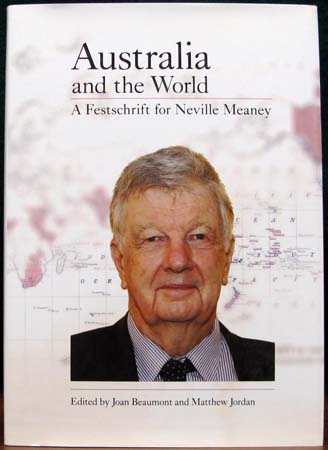
He will be greatly missed.
Neville’s funeral will be held at Macquarie Park Cemetery in the Camellia chapel on Tuesday 8 June at 2pm. I will be delivering a eulogy on his academic career at the service, and my column in the Australian Financial Review on Monday 7 June will be dedicated to his profound influence on Australian intellectual and public life.
There will be a wake at Sydney University in the Holme building from 6pm that same day, 8 June.
James
James Curran
Professor of Modern History
University of Sydney

‘Not Your Average Survey: A Student-led COVID-19 Archive’
Recording Experiences of the Pandemic
Authors: Kristian Marijanovic and Bella Bauer
Earlier in December, we heard from Nyree Morrison, from the University of Sydney Archives, on the University at the time of the Spanish flu. Considering nearly 40 per cent of the city was infected at one point, it was surprising how little we know about the University’s experience. One omission that stood out was that society records mentioned next to nothing about this disease that was ravaging the population. We cannot fill this absence but we can at least compensate for it by recording our current pandemic.
We are making a small but valuable archive of student and staff experiences of COVID-19, through an online survey and some interviews. Associate Professor Frances Clarke, who gave us the idea of the project, suggested its name, ‘Not Your Average Survey’, to which we added a subtitle, ‘A Student-led COVID-19 Archive’. It gets at the aim of the project, which is to record and preserve the experiences of a small but representative sample of people at the University during this time.
Beyond basic identifying details, such as gender and faculty, we wanted to know about people’s personal experience. We worked with Frances on setting out a series of questions, optional to answer and fairly open-ended, to get as many topics covered as we could; question 11 asks, ‘How would you describe the way this pandemic has reshaped your life?’ We wanted to know how people heard about COVID-19, what their initial response was, where they got their news about it from, and, of course, how they felt they were affected, whether it be socially, emotionally, education-wise, financially, or in any other way.
There were a few common themes in the survey responses. Some people enjoyed self-isolation; others didn’t. One staff member wrote, ‘Apart from missing physical contact with colleagues, the work experience has been exactly the same as it would be in person.’ But with mental health an oft-mentioned issue, it is clear it was a mixed experience. One staff member, who works in administration and was asked about how her thinking changed about the pandemic, wrote about ‘[m]ental health and feeling less trapped at home as time has passed’.
There were a range of attitudes to online learning but people generally felt the University responded as best as it could. One FASS student felt her ‘transition into online university was pretty good’, although she found it ‘interesting watching every authority figure refer to these as “unprecedented times”, whilst generally giving very few allowances for subpar work.’ A staff member, an Educational Designer, wrote, ‘We went into the proctored exams project knowing it would almost certainly disproportionately affect students who were of lower SES, in particular those in insecure housing or without financial resources’, and this could only be mitigated.
What of restrictions in general, beyond online learning and university? The new circumstances could be frustrating. One academic spoke about how her church adjusted to restrictions. She described what she did instead of singing, during in-person services; she clapped her hands and laughed loudly, saying, ‘I do percussion with my feet, with my hands, and I hum—and I feel frustrated!’ A FASS Honours student wrote that her ‘brother has bought 7+ Louis Vuittons [with stimulus money] … I frankly am frustrated constantly because my brother, the micro biologist, ignores COVID. He’s had 5+ people sleep over before, and he’s gone out clubbing.’ On a more serious note, one staff member wrote that ‘[f]amily relations became strained as we were confined to our home.’ These, more sensitive topics are something we wanted to record but it is difficult; this staff member provided little on the subject and, understandably, did not want to be interviewed.
We felt oral histories would complement the survey responses; interviews would give more depth, more vitality, to individual respondents. About 40 staff and students said they would be willing to be interviewed but many of these eventually ruled themselves out, as we started interviewing in late October, about two months since the last sizable amount of responses were submitted. Nonetheless, we conducted 10 interviews with 10 people, which ranged from half an hour to an hour in length. Five interviewees were professional staff, three were academic staff, and two were students. Associate Professor Julia Horne helped us plan the interviews, and we had two History Beyond the Classroom students, Claudia Rosenberg and Caitlin Williams, volunteering as interviewers.
Of course, there were issues with the survey and interviews. Diversity, for one. There were only three male interviewees and five of the interviewees were professional staff. It was a similar issue with the survey responses. As of 1 November, we recorded 139 responses. 74 per cent of respondents were female, 45 per cent were affiliated with FASS, and 91 per cent of students were domestic. Zoom interviews could be problematic. They were not recorded in an archivable file format, unlike the in-person interviews, and the interview sometimes might not ‘flow’ well; it is the same issue with a Zoom classroom. There were some other issues and oversights, such as neglecting to ask respondents for their age.
It is the end of this tumultuous year. The UK and the US have just approved vaccines. With the virus under control in Sydney, it seems like there will not be another opportunity to record how people experienced self-isolation and the other things that came with this pandemic. While we only began accepting responses from late June, which was after the State Government lifted some restrictions, this is still a valuable archive. It is a small but, we feel, representative sample of the University during this time.
Kristian Marijanovic and Bella Bauer

The Ends of Empire
Do Empires End? And what about the ‘leftover’ colonies?
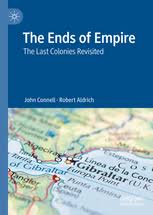
What do Christmas Island, Gibraltar and Greenland have in common? Those places, like American Samoa, the British Virgin Islands and French Polynesia, are all overseas territories of larger continental states, often far removed from the ‘mainland’ of which they are a part. They are the remains of older colonial empires that never gained independence. About fifty such territories spread around the world continue to be administered by Britain, France, the Netherlands, Denmark, Spain, the United States, Australia and New Zealand. Most are small island countries in the Atlantic, Caribbean, Indian Ocean and Pacific, though they also include large countries such as Denmark’s Greenland in the North Atlantic and French Guiana in South America. A few are famous – St Helena, a British territory, was Napoleon’s home in exile. Others have been the source of disputes, from an independence movement in French New Caledonia to conflict between Britain and Argentina about sovereignty over the Falkland Islands and by Britain and Spain over ‘possession’ of Gibraltar. Yet other territories – the Cayman Islands, Ceuta and Melilla, Saint-Pierre-et-Miquelon – are well known only to avid map-readers or travellers to exotic sites.
The Ends of Empire: The Last Colonies Revisited, by two University of Sydney academics, Robert Aldrich, Professor of European History, and John Connell, Professor of Geography, examines these fascinating spots around the globes, reflects on why decolonisation seemingly stopped before reaching these outposts, and what stakes they represent in the contemporary world. Their new 522-page book, published by Palgrave Macmillan in London, ‘revisits’ territories first explored in two co-authored volumes they published twenty years ago: France’s Overseas Frontier (1992) and The Last Colonies (1998). The Ends of Empire, however, is a completely new book, looking at what has changed and what has not changed in these places over the last decades and situating them in the context of the complex politics, cultural issues, economics and international relations in the twenty-first century.
The authors argue that, rather than being seen as failures of decolonisation, these overseas countries and territories represent a kind of negotiated ‘semi-sovereignty’ that, for most of their inhabitants, brings the sort of security and standard of living that would be endangered if they became independent. Their residents, for the most part, are fully-fledged citizens of the larger nation-states to which the territories belong, and they have rights of abode there. They are eligible for social welfare payments, they have access to better education and health care than is available to most of those who live in similar neighbouring countries, and they have increasingly gained recognition for local Indigenous and the Creole cultures. The internet age has plugged in many remote and isolated territories to the wider world, and easier travel has made it possible for larger numbers of people to move in and out of the territories. Because of all this, all referendums proposing independence for these territories in recent years have been defeated.
These territories are nevertheless faced with the problems of dependent economies, occasional social and ethnic discord, scandals caused by corruption and dodgy financial affairs, natural disasters and the threats of climate change, and issues surrounding irregular migrants and refugees. Their leaders bicker continuously with metropolitan authorities about the division of power between national and local authorities and the niceties of constitutional status. Some worry about the designs of outside powers and object to the militarisation of their territories. There is concern about who actually ‘belongs’ in these countries, some with Indigenous people such as Polynesians, Kanaks and Inuit, and all with cosmopolitan populations created through decades or sometimes centuries of colonialism and more recent movements of people.
Australia’s Christmas Island, the Cocos (Keeling Islands) and Norfolk Island are three of these overseas territories. Debates about the use of Christmas Island for detention camps for refugees and possible quarantine stations for those with coronavirus underline the fact that the Australian external territories, like those of other places, are not just international oddities with merely folkloric interest. Their variegated histories and cultures are typical of the mixing and mingling of peoples and cultures that characterise the diverse overseas territories, from the French island of Reunion – with over a million people descended from European settlers, African slaves and Indian indentured labourers – to Pitcairn Island – a British territory of only several dozen inhabitants who trace their ancestry to the survivors of the mutiny on the Bounty and the Polynesians who ended up on the islands with the mutineers.
This interdisciplinary study provides a new perspective on the history of decolonisation and a comprehensive analysis of a group of territories that have not become independent and whose residents, in the main, do not wish for them to do so. It examines the way cultures have blended, political authority has been negotiated, economic structures have evolved, and even small outposts have been drawn into the currents of the contemporary world order. It also considers other anomalies in among independent nation-states, from European micro-states that have survived for hundreds of years to countries of uncertain or unrecognised sovereignty, and from areas of new colonial expansion such as the South China Sea to places where there remain militant independence movements such as West Papua or demands by First Nations people for acknowledgement of their special position. It highlights the legacies left by colonialism even in small islands and enclaves sometimes forgotten by outsiders. The Ends of Empire suggests that imperial situations will probably never come to an end, but that the very existence of these semi-sovereign overseas territories mandates thinking anew about what decolonisation, nationalism and sovereignty mean in today’s world.
The Ends of Empire will be available in Australia in October 2020. For further information, see https://www.palgrave.com/gp/book/9789811559044
Semester Two 2020
 A message from The Department of History  From the Chair of Department From the Chair of DepartmentDear Students, As we ready ourselves for the second semester of 2020, we are reminded how vital the study of history is to so many events that dominate our lives today. Whether it is the global pandemic, the Black Lives Matter marches, or the heightening of tensions between and within nations in a time of crisis, the History Department is deeply committed to providing context for these events, and helping us to think critically about the past, and present. Come join us in our classes in second semester. Work closely in small groups with academics across the Department in our History Workshop, or sample one of our survey units covering wide-ranging topics like Modern American History, Brexit in Historical Perspective, China and its Frontiers, Fascism and Antifascism, and even the History of Sydney’s dark side. For advanced students, you can delve more deeply into the History of the High Renaissance, Modern China, or take one of our capstone units on History and Historians, which looks at major historiographical problems, or History Beyond the Classroom – in which you get to work with a local or community organisation to create a public history project together. We have something for everyone, and we are looking forward to having you back in our classes. Department of History Undergraduate guide Semester 2 2020 We are delighted to confirm our offerings for Semester 2. The full details can be found in the Department’s Undergraduate Student Guide, and here are links below to each of the units. HSTY1001 History Workshop HSTY1003 Birth of the Present:The World since 1750 HSTY2626 Fascism and Antifascism HSTY2631 Sin City? A History of Sydney HSTY2642 Beyond the Great Wall: China’s Frontiers HSTY2712 American History from Lincoln to Trump HSTY2717 Brexit in Historical Perspective HSTY3700 The East is Red: China 1949-1997 HSTY3714 High Renaissance HSTY3902 History Beyond the Classroom HSTY3903 History and Historians History Honours More information For enquiries about changing your enrolment please contact [email protected] For all enquiries concerning the contents of units, please get in touch with the lecturers themselves, whose contact details are on the Department of History website. You can enrol through Sydney Student The public website listing which units are available can be found here FASS Semester 2 webpage. We’re looking forward to seeing you in Semester 2! Best wishes, Professor Mark McKenna Chair of the Department of History  Curious about FASS students’ Semester 1 experience? Curious about FASS students’ Semester 1 experience?Click here to read ‘Scepticism to surprise: Teaching excellence continues during COVID-19‘ Keep in touch Phone +61 2 9351 2222 ABN 15 211 513 464 CRICOS Number: 00026A Please add [email protected] to your address book or senders safe list to make sure you continue to see our emails in the future. Manage your preferences | Opt out from these emails Got this as a forward? Sign up to receive our future emails. View this email online. Disclaimer | Privacy statement | University of Sydney |
Congratulations to Sophie Chao

A message from the Chair of the Department, Professor Mark McKenna
Our post-doctoral research associate, Sophie Chao, was recently awarded the John Legge prize for the best thesis in Asian Studies from the Asian Studies Association of Australia (ASAA). Sophie’s thesis also received the 2019 PhD thesis award of the Australian Anthropological Society.
I’ve included the ASAA citation below. On behalf of the History Department, I’d like to offer Sophie our warm congratulations for such a wonderful achievement.
All best wishes, Mark
John Legge Prize for Best Thesis in Asian Studies (2019)
Winner: Sophie Chao, In the Shadow of the Palms: Plant-Human Relations Among the Marind-Anim, West Papua. (Department of Anthropology, Macquarie University).
In this remarkable thesis, Sophie Chao provides a ground-breaking exploration and analysis of dynamic plant-human-capital relationships in West Papua. The study centres on the devastation wrought by state-sponsored agro-industrial capitalism in the form of oil palm plantations, as experienced and perceived by the Marind-Anim people of Merauke District. Beautifully written, theoretically sophisticated, and deeply empathetic, the study shows how a lethal process of botanical colonization has disrupted existing multispecies networks and reconfigured people’s ways of being in the world. The effects on places, persons, time, and indeed dreams are persuasively explained as interlinked processes of deterritorialization and detemporalization. Rooted in cultural anthropological methods and informed by post-humanist theory, the analytical approach incorporates insights from environmental humanities, science and technology studies, plant science, ethnobotany, political economy and more. The thesis is extremely ambitious in its conceptual and theoretical aims, and required a high degree of political and ethical sensitivity in the associated fieldwork. It has emphatically delivered on all fronts. It seems destined to inform and provoke productive debate over sustainable environmental, economic and social systems, in Indonesia and elsewhere.
Farewell to Miranda Johnson
Dear Colleagues and friends of History,
Because we may not all get an opportunity to see Miranda before she formally takes up her new post at the University of Otago, I wanted to say a few words before she leaves. It goes without saying that her departure will be a huge loss to the Department, SOPHI and the University.
Miranda started with Warwick Anderson in REGS in August 2012 as one of the first PDRAs in the Laureate program. As Warwick often has said, she proved to be not only a wonderfully engaging and productive colleague and collaborator, she intellectually transformed the program, especially though her ideas about Indigenous racial modernities. It was during this period that she wrote The Land is Our History (2016) and organised a very successful international conference resulting in the co-edited collection Pacific Futures: Past and Present (2018). She worked hard to build programs in Pacific and Indigenous histories in the Department and across the University, a valiant effort she redoubled on taking up a teaching position in the Department in July 2015, where she immediately excelled.
In 2017, Miranda’s teaching was acknowledged with a FASS ‘Excellence in Teaching’ Award, particularly for her hands-on engagement with students and guests in her unit entitled The Pitcairn Project (where you can read about some of the students’ work).
In the same year, The Land is Our History, was shortlisted for the General History Prize in the NSW Premier’s History Awards. The judges described Miranda’s work in glowing terms:
‘The Land Is Our History’ is a superb example of the power of comparative, transnational historical research. It explores indigenous rights movements, from the late 1960s onwards, across three Commonwealth settler states — Canada, Australia and Aotearoa New Zealand. Miranda Johnson draws on a rich array of source material, including legal cases, petitions, interviews and media reports, to create an engaging and path-breaking book.
In 2018, The Land is Our History was awarded the W.K. Hancock Prize of the Australian Historical Association, and it is worth quoting the citation in full:
Miranda Johnson has produced an ambitious, original and imaginative history exploring land, indigeneity, legal rights and activism across three settler-colonial nations. Thinking transnationally, Johnson explores legal and public discourses to draw together a raft of distinctive events and personalities into a vast and coherent canvas. She weaves nation-based histories of indigenous-settler conflict over land into wider networks and power structures, making sense of seemingly disparate developments in indigenous activism. Archival documents and oral accounts highlight the strength and moral authority of indigenous leaders who worked to gain acknowledgement of traditional ownership of land, and to interrupt and influence public debates around national identity. Johnson writes with precision, flow and economy. The work has a compelling argument, convincingly showing the complex and sophisticated ways indigenous activisms functioned to change settler attitudes towards land and indigenous belonging. An exemplary history, The Land Is Our History brings important new insights to a significant topic in both the past and the present.
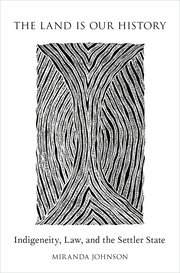
Miranda talked about her work with student Ryan Cropp.
More recently, Miranda showcased some of her new work on legal history and Native identities in an essay in the internationally renowned journal, American Historical Review, entitled “The Case of the Million Dollar Duck: A Hunter, His Treaty, and the Bending of the Settler Contract.”
I’ll always remember co-teaching ‘Frontier Violence in Modern Memory’ with Miranda in 2017. There’s probably no better way to get to know your colleagues! Working closely with Miranda allowed me to see first-hand what a brilliant teacher and scholar she is. I heard nothing but praise and appreciation from students for her teaching and I picked up quite a few tips watching her lectures from the front row.
Miranda’s commitment to her students, the Department and the broader University community is on graphic display in her recent reflection on online teaching, published online in Meanjin.
It’s a plea for ‘the poetics of in-person classroom teaching, not as a value-added extra for an elite cohort, but as the essence of what we do’. It’s also a reminder of what her students and colleague will miss when she goes.
We need to establish respectful and generative classroom dynamics quickly with and among our students, many of whom do not know each other. These dynamics must be subtly but firmly maintained. How do you draw out the shy ones? Put them in small-groups, often awkward in many of the classrooms we are working in, but achievable if the chairs or tables can be moved around. How do you moderate the domineering over-talker in class? Sit beside them. Make eye contact with everyone during the session, although not too much. Help them be seen. Notice the one who pushes his chair back, angling his body back from the desk, his gaze directed anywhere but here. Bring him back. Watch for the over-anxious, fastidiously taking notes in order to avoid answering questions.
I’m sure that I speak for everyone when I wish Miranda and her family well for their future lives and careers in Aotearoa NZ.
All best wishes,
Mark McKenna, Chair, Department of History

History of University Life Seminar
 History of University Life 2020 Sydney Research Webinar Series in Higher Education Wednesday 5 August 2020 | 4:00-5:00pm What do we learn from a history of international students at Australian universities? To examine this question and others about the social and political economy of international students in Australia since the 1960s, join our second 2020 History of University Life online seminar with panellists Julia Horne, University Historian at the University of Sydney, and Gaby Ramia, Associate Professor in Public Policy at the University of Sydney. We will also hear from international students about their experience in Covid-19 times. Chaired by Matthew A. M. Thomas, Senior Lecturer in Comparative Education and Sociology at the University of Sydney and co-convenor of History of University Life. Julia Horne is Associate Professor in the Department of History who works on the history of higher education in Australia from 1850 to the present-day. Her books include Sydney the Making of a Public University (Miegunyah Press, 2012, co-authored with Geoffrey Sherington) and Preserving the Past: The University of Sydney and the Unified National System of Higher Education 1987-96, (Melbourne University Publishing, 2017, co-authored with Stephen Garton). In 1999-2002 she created a substantial archive of in-depth surveys and interviews with international students about their Australian experiences in the 1950s and 1960s (for UNSW Archives). Gaby Ramia is Associate Professor in Public Policy in the Department of Government and International Relations and Theme Co-Leader, Smart and Working, in the NSW Institute of Public Policy, at The University of Sydney. His books include Governing Social Protection in the Long Term, (Palgrave Macmillan, 2020) and Regulating International Students’ Wellbeing (Policy Press, 2013, co-authored with Simon Marginson and Erlenawati Sawir). Gaby is currently one of three Chief Investigators on an Australian Research Council funded study on international student housing precarity. Matthew A.M. Thomas is a senior lecturer in comparative education and sociology of education at the University of Sydney. He has worked as a public school teacher in the United States and as an educational researcher, educator, and consultant in Australia, Mali, Nigeria, Indonesia, Tanzania, and Zambia. His research examines educational policies, pedagogical practices, teachers’ lives, and the changing roles of teacher and higher education institutions. Most recently, Matthew is the co-editor of Examining Teach For All (Routledge, 2020) and the Handbook of Theory in Comparative and International Education (Bloomsbury, 2021). Future seminar dates for your diary in this special series 23 September @4-5pm 14 October @4-5pm 4 November @4-5pm 2 December @4-5pm These online seminars are brought to you by History of University Life Sydney Research Seminar in Higher Education. History of University Life began in 2008 as a joint forum between the University of Sydney and St Paul’s college to discuss the history and role of universities in Australian life. Many thanks for the support of St Paul’s College since 2008. And thanks, too, for the wonderful assistance for the 2020 online series provided by the School of Philosophical and Historical Inquiry, University of Sydney. For more information about the series please email the History of University Life convenors Click here to email. |
| Registration The Zoom webinar link will be sent as an email and calendar invite on the Monday prior to the event. If you registered for the entire series when you registered for the last seminar, you won’t need to register again. You will receive an invitation to this webinar automatically. New registration? please click here to RSVP Missed the first seminar? If you missed the first seminar, or would like to watch it again, the webinar in this special series is now available online on the SOPHI talks site. HUL on Social Media Please use the hashtag #UniKeeper for your social media posts. You can follow the History of University Life on Twitter @HULseminar. Other social media Follow SOPHI on Twitter Follow SOPHI on Facebook Follow St Paul’s College on Twitter See the Department of History blog Image by Max Dupain reproduced courtesy of the University Art Collection, University of Sydney. |
University Education is a Pathway to Employment
History of University Life II Sydney Research Seminar in Higher Education
You can now listen to and watch a recording of the full session above, here.
On Wednesday 24 June 2020, History of University Life* held its first live online seminar with an audience of 90 people. Professors Ariadne Vromen (ANU) and Susan Goodwin (University of Sydney) joined a panel with University Historian Julia Horne to discuss the importance of public investment in our public universities.
Just days before, the Commonwealth Minister of Education Dan Tehan announced far-reaching changes to HECS fees and university funding for teaching. The announcement prompted the panel to focus even more sharply on what exactly needs to be reformed and why.
Ariadne Vromen argued that we owe young people citizenship, employment and economic security. Ariadne explained that “the individual and social costs of young people’s exclusion from employment and education are profound and long-lasting”. We need as a nation, Ariadne said, to acknowledge that responsibility to create jobs lies with governments, industry and businesses. The government’s idea of “job ready” graduates subverts that greater responsibility.

Susan Goodwin unveiled UniKeeper, the social democratic plan to support public higher education. This plan has 3 planks: more affordable public higher education places; universal income support payments for higher education students and a proper plan to fund the public sector higher education teaching and research workforce.
Only 1 out of 3 university students receive any form of student income support and 82% of university students depend on paid employment to support them while they study.
This last figure is not surprising since Australia’s mass higher education is now one of the largest systems in the world (on the basis of population parity). Susan explained how “in Australia, young people’s citizenship is denied and eroded by enforced financial dependency on families.”

The questions flowed thick and fast. What do young people think? Should student income support be means-tested? How is higher education a public good? Who should lead the discussion on how to reshape higher education? Is ‘job ready’ a useful term in the discussion of higher education? These and more questions will be explored in the rest of this series. See SOPHI Events for further details.
* History of University Life II Sydney Research Seminar in Higher Education. History of University Life began in 2008 as a joint forum between the University of Sydney and St Paul’s college to discuss the history and role of universities in Australian life.
University Education as a Pathway to Employment was held as an online seminar on Wednesday 24 June 2020. Follow the link above for further details about this event including information on the panellists and to sign up for future webinars in this series.

History Student Prizes
Every year, the School of Philosophical and Historical Inquiry (SOPHI) holds a ceremony to recognise the brilliant endeavours of our students – both undergraduate and postgraduate.
This year we had to adapt to the virtual circumstances of the pandemic, so we celebrated both our Prize and Scholarship winners by holding the Award Ceremony as a Zoom webinar.
The fabulous SOPHI team, working with Tiffany Brittan from FASS, worked incredibly hard to come up with what we believe was a positive, engaging and fun event for our students, their families, and our donors. It was also a pioneering effort for the Faculty, as it was one of the first fully online Prizes night.
Over 135 people joined together to celebrate the extraordinary achievements of our students across the School, including many of our wonderful History students.
The History Prize Winners are listed below, followed by a note about what each prize recognises. You can also watch the speech of the History Department Chair, Professor Mark McKenna here, in which he congratulates the prize winners, and notes the special importance of History and the Humanities in times of crises.
The full program, including the award winners from each of the Departments of Archaeology, Classics and Ancient History, Philosophy, Gender and Cultural Studies, and the Scholarships awarded in International and Global Studies, can be found here. The full details of the History prizes listed below, are on pp. 17-19.
Many congratulations to all our Prize and Scholarship Winners.
HISTORY
Prizes
AE (Tony) Cahill History Prize
Robert Stone
Aisling Society of Sydney Prize for an essay on Irish or Irish-Australian History
Siobhan Ryan
Australasian Pioneers’ Club Scholarship
Elizabeth Heffernan
Charles Brunsdon Fletcher Prize for Pacific History
Robert Mason
Charles Trimby Burfitt Prize for the Study of Australian History Prior to 1900
Nicole Leong
George Arnold Wood Memorial Prize for History I
Clio Davidson-Lynch
George Arnold Wood Memorial Prize for History II
Samuel Goldberg
GS Caird Scholarship in History II
Imogen Harper
Siobhan Ryan
Helen Newbon Bennett Memorial Prize for Senior History
Briony Moore
History Department Prizes – For an outstanding essay on a subject relating to social justice and/or social inclusion
Sarah Blencowe
Samantha Whaitiri-Faitua
History Department Prizes – For outstanding work in HSTY3901
Samuel Lewis
History Department Prizes – For outstanding work in HSTY3902
Amanda Armstrong
History Department Prizes – For outstanding work in HSTY3903
Siobhan Ryan
Isabel M King Memorial Prize for History III
Georgia Horsley
J H M Nolan Memorial Prize for Proficiency in History
Pola Cohen
Philippe Erdos Prize in History
Elisabeth Barber
Scholarships
Undergraduate Equity Scholarships in History
Aisha Allazze
Micaila Bellanto
Darcy Campbell
Lydia Fagan
Theresa Moran
Laura Sole
Trent Taylor


